“Storytelling, Archives, and Resilience”: reflecting on the role of community archives in the Boston Marathon bombing
 On Monday, April 23 – five years and a week after tragedy struck Boston in the form of the Boston Marathon bombing – faculty, staff, students and members of the community gathered in Alumni Center to share reflections on remembering traumatic events and processing grief through collections and digital archives. The event commemorated five years of collecting objects and memories in “Our Marathon: the Boston Bombing Digital Archive,” a project that originated at Northeastern through efforts in the NULab for Texts, Maps and Networks, the College of Social Sciences and Humanities, and the Northeastern University Libraries. This year, faculty, staff and graduate students worked to migrate the site’s contents and metadata onto a new digital space under library management, giving it a long-term home where the collection can be preserved. Megan Barney, Lauren Bergnes Sell and David Heilbrun will reflect on their experience completing this migration in future blog posts.
The event featured a panel of scholars whose work has been grounded in collecting and preserving so-called “grief archives,” including:
On Monday, April 23 – five years and a week after tragedy struck Boston in the form of the Boston Marathon bombing – faculty, staff, students and members of the community gathered in Alumni Center to share reflections on remembering traumatic events and processing grief through collections and digital archives. The event commemorated five years of collecting objects and memories in “Our Marathon: the Boston Bombing Digital Archive,” a project that originated at Northeastern through efforts in the NULab for Texts, Maps and Networks, the College of Social Sciences and Humanities, and the Northeastern University Libraries. This year, faculty, staff and graduate students worked to migrate the site’s contents and metadata onto a new digital space under library management, giving it a long-term home where the collection can be preserved. Megan Barney, Lauren Bergnes Sell and David Heilbrun will reflect on their experience completing this migration in future blog posts.
The event featured a panel of scholars whose work has been grounded in collecting and preserving so-called “grief archives,” including:
- Dan Cohen, Vice Provost for Information Collaboration and Dean of University Libraries and co-director of the 9/11 Digital Archive
- Ashley Maynor, award-winning filmmaker behind The Story of the Stuff and currently Digital Scholarship Librarian at New York University
- Elizabeth Maddock Dillon, Our Marathon Principal Investigator and currently Professor of English at Northeastern University
- Kristi Girdharry, the Our Marathon Oral History Project Manager and currently Assistant Professor of English at Johnson and Wales University
- Jim McGrath, Co-director of the Our Marathon project and currently post-doctoral Fellow in Digital Public Humanities at Brown University.
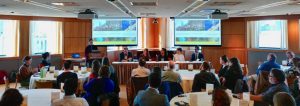
Amanda Rust introduces panelists
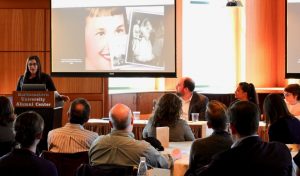
Ashley Maynor
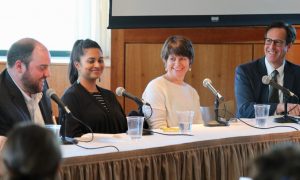
From left: Jim McGrath; Kristi Girdharry; Elizabeth Maddock Dillon; Dan Cohen
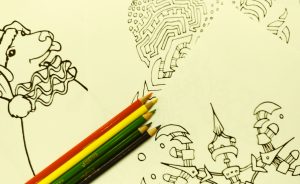 Firstly, we’ll have a coloring table beginning on Reading Day and all through finals week set up in Snell’s Lobby. Coloring is a fantastic, proven way to reduce stress and focus on something other than college. We’ll also have positive post-it notes for inspiration and some bubble wrap to pop your stress away!
On Reading Day, we’ll have massage chairs with professional masseuses as well as energy filled snacks to hand out from 12-4 PM. A big thanks to our friends at
Firstly, we’ll have a coloring table beginning on Reading Day and all through finals week set up in Snell’s Lobby. Coloring is a fantastic, proven way to reduce stress and focus on something other than college. We’ll also have positive post-it notes for inspiration and some bubble wrap to pop your stress away!
On Reading Day, we’ll have massage chairs with professional masseuses as well as energy filled snacks to hand out from 12-4 PM. A big thanks to our friends at 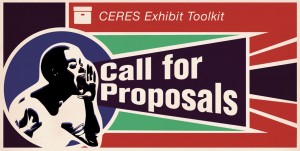 It’s that time of year again – time for the CERES Call for Proposals! This year the
It’s that time of year again – time for the CERES Call for Proposals! This year the